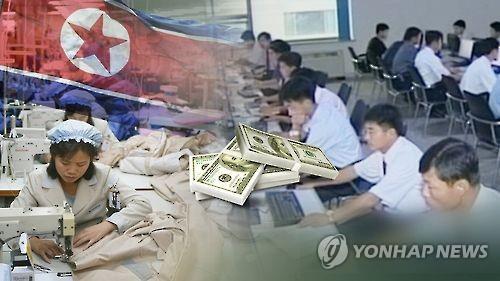North Korea is presumed to have suffered some $200 million in foreign currency loss for nine months after the U.N. Security Council slapped tough sanctions in early March of last year, a report showed Wednesday.
The sanctions dented North Korea's foreign currency earnings as it hurt Pyongyang's exports to China and hard currency earnings sent by overseas workers in the March-November period of last year, according to the report by the state-run Institute for National Security Strategy.

The estimated loss is equal to 7.4 percent of North Korea's total 2015 exports of $2.7 billion, it said.
"The shutdown of an inter-Korean industrial complex hit the North's foreign currency earnings the most severely," the report showed. "Also the country's exports to China, sales of weapons and all of its practice of collecting hard currency from overseas including repatriation of wages earned by laborers were squeezed."
The UNSC adopted the sanctions resolution 2270 the punish Pyongyang for its nuclear and missile tests conducted early last year. In November, it again slapped a set of sanctions to penalize North Korea for another underground nuclear weapons test in September.
The institute's calculation is the same as that unveiled by the government on Dec. 2 following the announcement of its fresh unilateral sanctions against Pyongyang.
"North Korea is likely to further sustain foreign currency loss as the UNSC imposed a significant cap on Pyongyang's exports of coal by adopting resolution 2321 late last year," Jeong Joon-hee, spokesman at Seoul's unification ministry, told a press briefing.
The new sanctions were slapped to close loopholes found in the previous resolution, under which North Korea's coal exports for "livelihood" purposes were allowed, an exception that has been exploited by the country.
More than 50,000 North Koreans are working overseas, mainly in China and Russia, and they are compelled to send money earned back to the Pyongyang regime. The reclusive country is estimated to earn more than $200 million per year through labor exports.
The report said that countries including China and Kuwait are tightening their regulations on North Korean workers' entry and stay in an apparent move to avoid employment of North Koreans.
In the face of the hard currency squeeze, the North regime is pressing its officials and ordinary people give more money to the state, fueling more grievances, it said.
"It is important to consistently implement the sanctions as they affect the North Korean economy and the management of the regime," it added. (Yonhap)






![[Today’s K-pop] Blackpink’s Jennie, Lisa invited to Coachella as solo acts](http://res.heraldm.com/phpwas/restmb_idxmake.php?idx=644&simg=/content/image/2024/11/21/20241121050099_0.jpg)
